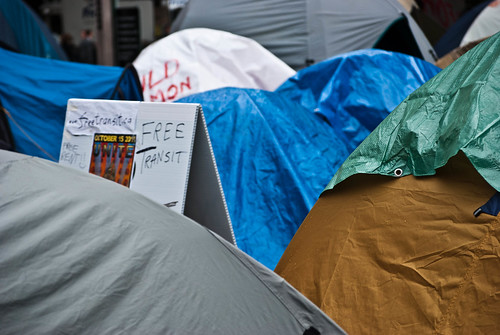
Don’t be afraid to pitch ideas for discussion! You never know what your ideas may lead to… (image c/o duncan on Flickr)
With a little under two months to go, most people are probably mulling over what they would like to discuss at the London Radical Librarian Collective gathering. If you are stuck for ideas and need a little inspiration, we’ve archived details of all the sessions that were run at the Bradford gathering in September last year (available here). If you have an idea for a session and you’d like to share it in advance, please feel free to add it to the pitches page on the wiki. You don’t need to sign up for an account or request membership of the wiki to add your session, the page is ‘unlocked’ and free for anyone to edit. And if you want to expand on it by writing a guest post for this blog, please do get in touch and let us know. We’re more than happy to host your thoughts and ideas related to either proposed sessions or radical ideas that are related to the motivations behind the Radical Librarian Collective.
So far, we have two pitches up on the wiki:
An apparent lack of Critical Theory in LIS?: Vocationalisation of a critically reflexive discipline, depoliticised neutrality and the fallacy of “employability”.
(Kevin Sanders – @moananddrone)
Should employers be training employees and academic courses be encouraging those undertaking LIS studies to be producing and developing critically-founded knowledge?
Libraries have a steeped history in social politics and the neutrality that emanates from the contemporary sphere appears to continue a wider narrative of passivity from individuals that have lost agency in the political domain: Is the often assumed objective, neutral position of the profession is a flawed limitation, and is there a lack of critical foundation within the field of LIS? Has this contributed to a depoliticisation (or political apathy) across the field?
Without critically aware staff, how can the library and information professions be said to be informing, enhancing, assisting, teaching or training information skills to their patrons? Can we locate and provide relevant information and sources of information without critically evaluating at subjective and intra-subjective levels?
Disseminating radical ideas
(Dan Grace – @danpgrace)
What outlets are there for communicating radical ideas both in the day-to-day of our working environment and throughout the wider working communities we engage in? How can we work at multiple levels – personal, workplace, “professional” (urgh, sorry…) and scholarly communities – to effectively counter the prevailing capitalist/statist discourses? Should we prioritise any of these levels over others? What potential is there in existing institutions/relationships/structures, i.e. unions, journals/publishers etc., and to what extent do we need new forums and spaces? What form should these spaces take?
Radical Librarian Collective is all about providing a space to challenge neoliberal perspectives and to find ways in which we can facilitate dialogue in order to organise and bring about positive changes for a holistic, collective future. To that end, sessions at Radical Librarian Collective gatherings play an important role in facilitating this discussion and in finding ways to challenge the increasingly dominant neoliberal narrative. So if you have an idea for a session, or a particular topic you would like to discuss in relation to the values we share, then please feel free to add them to the wiki. The radical librarian conversation starts here!







